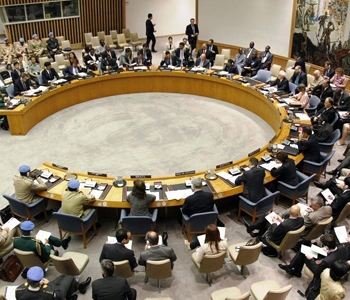Security Council renews Sudan sanctions panel of experts
February 12, 2015 (KHARTOUM) – The United Nations Security Council (UNSC) onThursday renewed the mandate of a group of independent experts to monitor a weapon embargo in Darfur.

The 15-member Council unanimously adopted resolution 2200 (2015) renewing the mandate of the five-expert panel for 13 months until 12 March 2016.
The UNSC “expresses its intent to review the mandate and take appropriate action regarding further extension no Iater than 12 February 2016,” said the resolution which was drafted by the US delegation at the UN.
The text of the resolution underlines Sudanese government’s obligation to seek the approval of the panel for movement of weapons and ammunition into Darfur. It also regretted “routine” conveyance of such materiel by the Sudanese army and affiliated armed groups as it was mentioned by the experts in their report released last January.
The UNSC condemned the attacks on Darfur civilians by government militias and encouraged the panel members to provide the sanctions committee with the names of individuals involved in such violations.
It further pointed to the use of IDPs camps by “the armed groups, including those opposing the Government of Sudan, to gain a military advantage in a manner that places the civilians and civilian objects at risk from the dangers arising from armed conflict”.
Following the adoption of the resolution, US ambassador to the United Nations Samantha Power recalled to the Council that Sudan had prevented the investigation of a mass rape in Tabit while the report released by the Human Rights Watch on the matter confirms it.
Power pointed to the limits of the international organization, saying “the sanctions regime is impotent when the Sudanese government systematically violates it, and the Council cannot agree to impose sanctions on those responsible for the violence and the abuses”.
However, she underscored that the resolution 2200 (2015) is important because the council members for the first time condemn the attacks committed by the government-backed Rapid Support Forces.
“For the first time it urges the Sudanese government to account for the situation of civilian populations, who are suffering from devastating waves of attacks in North Darfur, like the reported mass rapes at Thabit,” she said.
Reacting to the US diplomat’s comments, Sudan’s government representative, Hassan Hamid Hassan, expressed regret that Power “repeated baseless accusations made by a non-governmental organisation headquartered in Amsterdam that encouraged the continuation of rebel movements that had rejected the peace agreements”.
Hassan claimed that Human Rights Watch (HRW) and other groups were not impartial witnesses, saying the report was fabricated.
(ST)
